Salmon is a delicious and nutritious food for humans packed with omega 3 fatty acids and a wide range of other nutrients. You may also have noticed that it is also a key ingredient in some dog food and dog treats. However, before feeding salmon directly to your dog, it is important that you do your research and check that it is safe. Salmon can be produced and served in a number of different ways and they are not all appropriate for dogs.
So, if you are wondering can dogs eat salmon here are the answers to all the key questions that you have.
Can Dogs Eat Salmon?
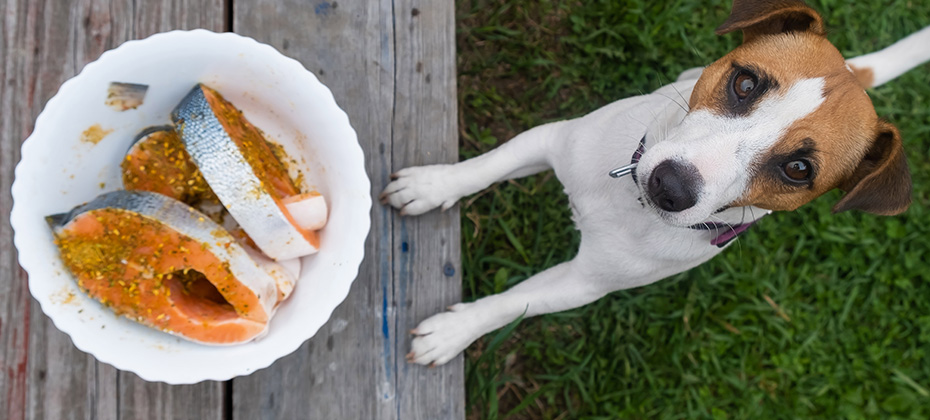
The simple answer is yes! Salmon is safe for dogs to eat and is found in salmon dog food. In particular, you may find it in dog food that is manufactured for dogs that have an allergy to other meat proteins such as beef or chicken.
However, just because it is safe does not mean that dogs should be eating salmon in the same way as humans. There are only certain types of salmon that dogs can safely eat. Not all human foods containing salmon are suitable for dogs.
Is Salmon Good for Dogs?
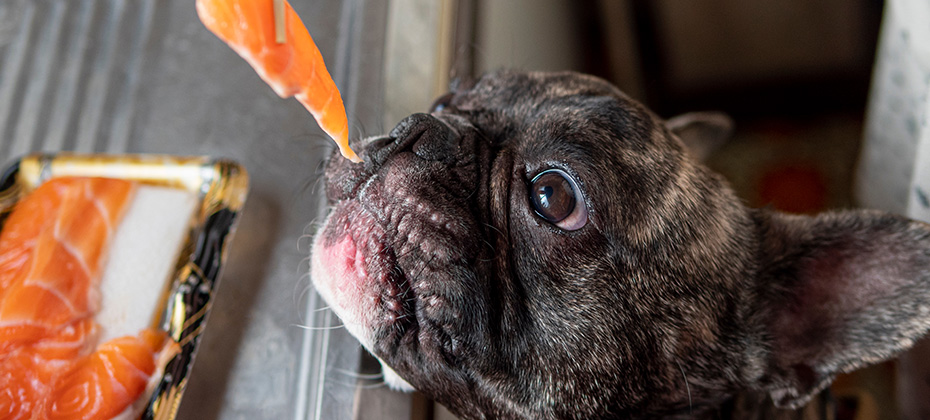
One reason that pet owners want to feed salmon to their dogs is because they think it is good for them. Salmon is a useful source of protein which is needed to keep your dog healthy and help them develop lean muscle. However, it has plenty of other health benefits. Salmon provides antioxidants and anti-inflammatories into your dog’s diet which can be useful for arthritis and some intestinal problems.
It is also a great source of omega 3 fatty acids. These are healthy fats that help to keep your dog’s coat healthy and promote healthy skin. Omega 3 fatty acids also help with cognitive function – these healthy fats are therefore important for younger dogs (who are being trained) and older dogs. Your dog’s immune system will also benefit from the introduction of salmon into their diet. It is rich in vitamins A, B, and D and contains the minerals potassium and selenium.
Can Dogs Eat Salmon Every Day?
If you are feeding your dog a dry kibble or canned food made with salmon (many high quality dog foods contain it as an ingredient) then they will be eating salmon every day and most dogs do very well on this diet.
However, if you are thinking that you may want to add salmon to your dog’s diet you need to be cautious about how much salmon you give them. Too much salmon is not good for them and can lead to health issues – dogs do best on a balanced diet.
In general, a dog can eat 2% of their body weight in salmon every week. So, if your dog weighs 20 pounds, they can have a maximum of 6.5 ounces of salmon in one week.
Can Dogs Have Salmon When They are Pregnant?
Are you thinking about feeding your pregnant dog salmon? Salmon is an ingredient in some dog food because it contains omega-3 fatty acids and these are very important for pregnant dogs.
They are essential nutrients for because fetal brain, eye and nerve development. It is safe for your pregnant dog to eat salmon (that is fresh and cooked) in small amounts but check with your vet first. They may recommend that you feed your dog a fish oil such as salmon oil as a supplement instead.
Check out our article on the Best Dog Food for Pregnant Dogs.
Can Dogs Eat Salmon Skin?
Most fresh salmon is sold with the skin on which begs the question can dogs eat salmon skin? It is best to remove the salmon skin before giving it to your dog. This is because salmon skin contains a lot of fat and this is where toxins and contaminants can get concentrated.
However, a little bit of well-cooked skin every now and again is not going to do them any harm.
Can Dogs Eat Cooked Salmon?
Cooked salmon is perfectly safe for dogs and is widely used in dog food. When it comes to feeding salmon to dogs, you must thoroughly cook it to make it safe. Prepare salmon by removing the bones as these can be a choking hazard for dogs. Alternatively, remove them when it is cooked. Cooking salmon for humans can be a complicated business using spices and sauces but when you cook salmon for dogs you must not add anything!
Either bake it in tinfoil in the oven or fry it using a small amount of vegetable oil. You know that salmon is cooked when it changes to a pale color and comes apart in large flakes.
Can Dogs Eat Raw Salmon?
As your dog’s ancestors would have caught raw salmon from rivers and lakes, surely it would be okay to feed raw salmon to your dog. Actually, this is not the case and it is not safe for your dog to eat raw or undercooked salmon.
The problem is that raw and uncooked salmon can contain tiny parasites as do many other types of raw fish. When dogs (or humans for that matter) eat raw salmon they ingest the parasite which is a type of flatworm called Nanophyetus salmincola. The flat worm itself is not harmful but it can carry a bacteria called Neorickettsia helminthoeca which causes illness in dogs. When a dog eats raw salmon, they ingest the bacteria which causes symptoms around six to ten days later. If you notice any of the following symptoms after feeding your dog raw salmon or undercooked salmon, you must take them to a vet immediately as they could be suffering from salmon poisoning disease. This disease can be fatal in dogs.
Can Dogs Eat Smoked Salmon?
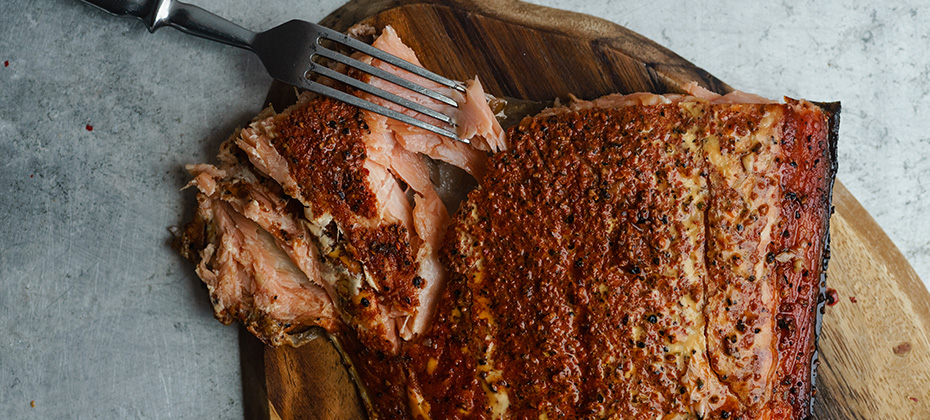
Tasty fresh boneless fillets of smoked salmon may seem like the perfect (if expensive) treat for your pooch but dogs should never eat smoked salmon. This is because the smoking process adds several ingredients to the fresh salmon that are harmful to dogs.
Firstly, there is a lot of added salt. Too much salt in your dog’s diet can lead to dehydration and illness. It is even possible for dogs to suffer from salt poisoning so watch out for this if your dog has accidentally eaten a lot of smoked salmon. The symptoms of smoked salmon poisoning in dogs include confusion, extreme thirst and urination and as well as vomiting and diarrhea.
Another hazard is that the hot smoking produces polycyclic aromatic hydrocarbons. These are carcinogenic and are a risk factor for cancer cell growth.
Buying Canned Salmon for Dogs – is that okay?
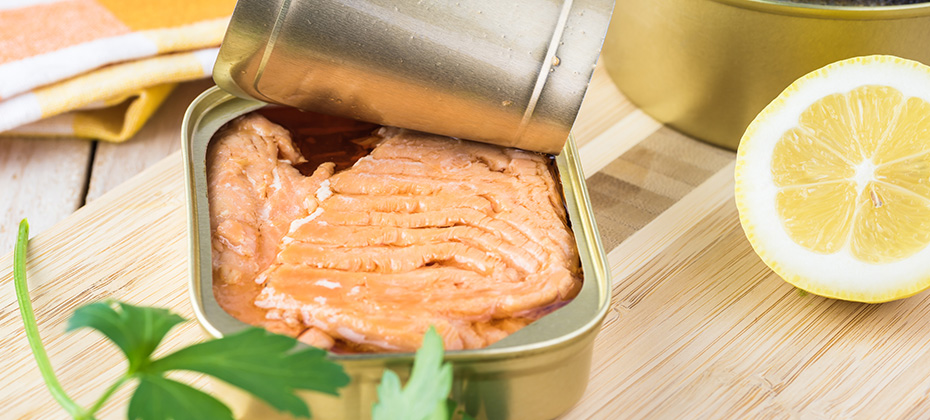
Canned salmon (and other types of canned fish) are a convenient and nutritious human food but should you feed tinned salmon to your dog? The answer is a little more complicated than a simple yes or no!
Canned salmon has been heat treated so you can feed it to your dog without worrying about parasites or bacteria. Canned salmon does not have the dangers of smoked salmon either so in theory it is safe to feed canned salmon to your dog.
However, when dogs eat canned salmon in oil it can result in your dog ingesting too much oil. Choose canned salmon in water not in oil or brine. When dogs eat canned salmon in brine they will ingest too much salt and this can be harmful. On the whole, the safest way for a dog to eat salmon is to buy it fresh and cook it. If you do feed your dog canned salmon don’t forget that it may have fewer fatty acids and more cholesterol than the fresh fish.
What are the Risks of Salmon for Dogs?
Salmon are a saltwater fish that can be produced as farmed fish or wild caught. Farmed salmon and wild caught salmon are used in dog food. In general, farm raised salmon is considered a little less healthy as it can contains more fat and has more calories. However, it also has a higher concentration of omega oils .
If you are thinking of feeding your dog salmon here are some of the potential health risks.
Heavy Metals
There is increasing concern about the levels of heavy metals in some sea food including salmon. Some dog owners worry that this could lead to a type of salmon poisoning. Mercury is of particular concern and there is a drive to find low mercury fish for animals and humans.
Mercury enters surface water (and ultimately the oceans) from industrial processes. As it passes up the food chain it becomes more concentrated. The fish with the highest levels of mercury are therefore the largest such as king mackerel. It is also a concern in tuna. However, salmon is a smaller fish and therefore less likely to have high concentrations.
The signs of salmon poisoning caused by mercury in dogs include diarrhea, vomiting blood, anxiety and tremors. It can also lead to hair loss and blindness. If you suspect that your dog has signs of salmon poisoning you must contact your vet right away.
Parasites
There are several parasites that can be found in wild caught salmon and farmed salmon. Parasites are something that you need to be aware of when feeding salmon to dogs specifically a parasite called Nanophyetus salmincola which carries a harmful bacteria called Neorickettsia helminthoeca.
Eating undercooked or raw salmon can give dogs a type of salmon poisoning that is life threatening.
Small Bones
Salmon can contain small bones even if it has been filleted. These are sharp and can cause painful scratches and even punctures in the mouth and throat. If they make it into the digestive tract they can cause punctures and blockages.
Always check through the salmon thoroughly before you offer it to your dog. Open up the flakes and pull them apart to reveal any hidden bones. Supervise your dog whilst they are eating the salmon in case they start to choke on a hidden bone.
Polychlorinated Biphenyls and Dioxins
These are both persistent industrial chemicals that have been released into the sea over decades. They are known carcinogens and there are concerns about the levels that are building up in fish. These chemicals are not naturally broken down and so the concentrations are going to increase.
Thaminase
Raw fish contains an enzyme called thaminase that breaks down vitamin B1. This leads to the levels in the body dropping. However, when the salmon is cooked the thaminase will be denatured and is no longer a problem.
Salmon Allergies
It is unusual for dogs to be allergic to salmon proteins but it is not impossible. Allergy symptoms can affect the intestines, skin, eyes and many other parts of the body. If you suspect that your dog has an allergy, speak to your vet. They will be able to work with you to sort out what your dog is allergic to.
Take a look at our guide on the Best Dog Food for Allergies.
What is the Best Salmon for Dogs?
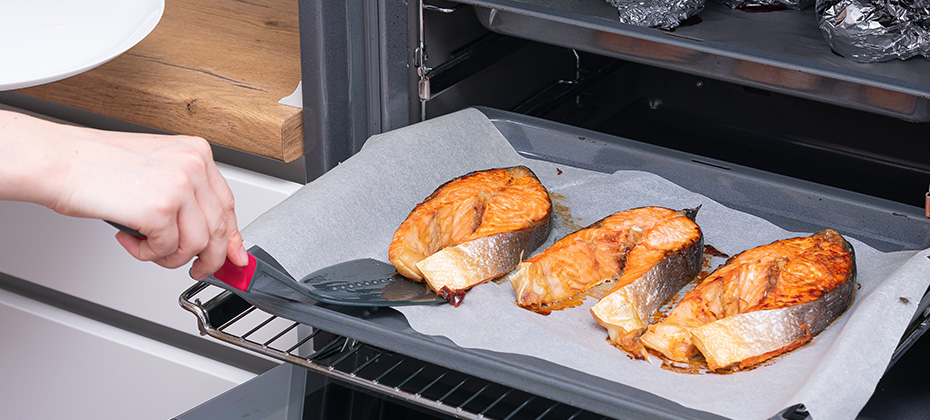
The best way to feed salmon to your dog is to buy it fresh and cook it yourself. When you feed your dog salmon keep it nice and simple to keep the salmon safe. Don’t add any ingredients that humans like such as garlic or pesto and don’t use a recipe with added salt or soy sauce such as salmon jerky. Dogs don’t need anything except the plain salmon flesh.
In general, wild caught salmon such as pacific northwest and pacific salmon are considered healthier and less contaminated than farm raised salmon although both are used in commercial dog food. Finally, try to remove the skin before feeding it to your dog. Yum!







